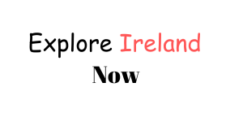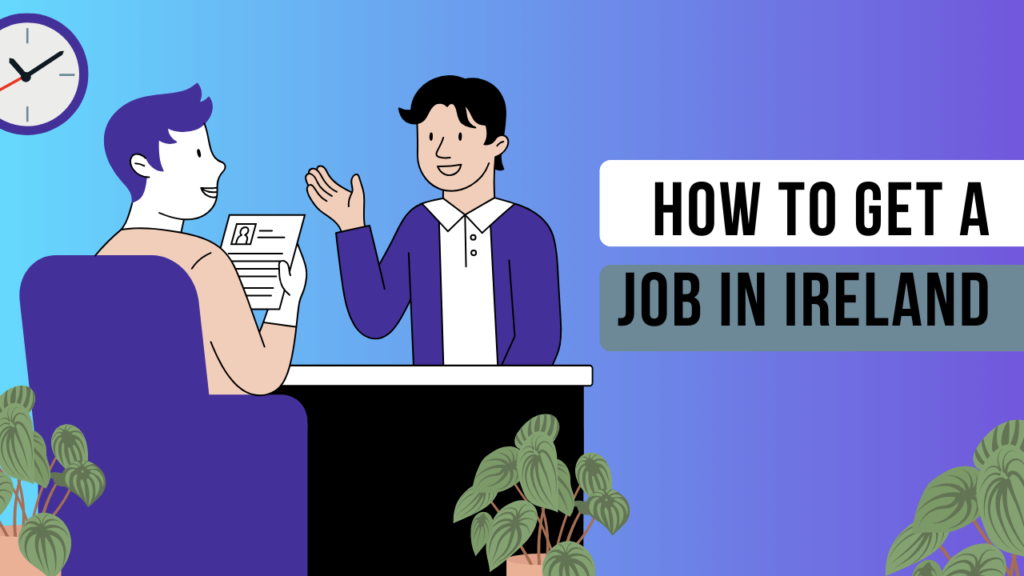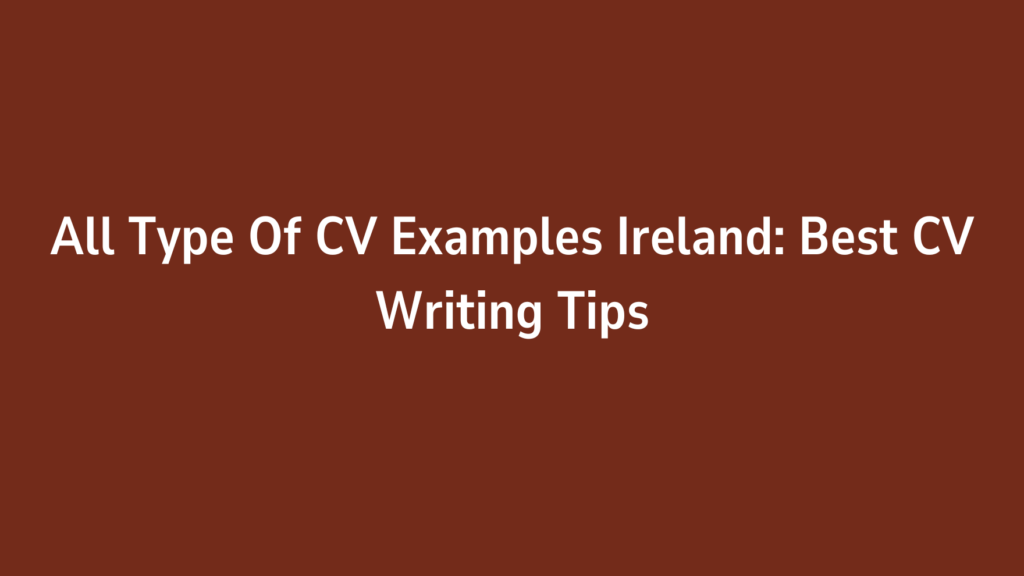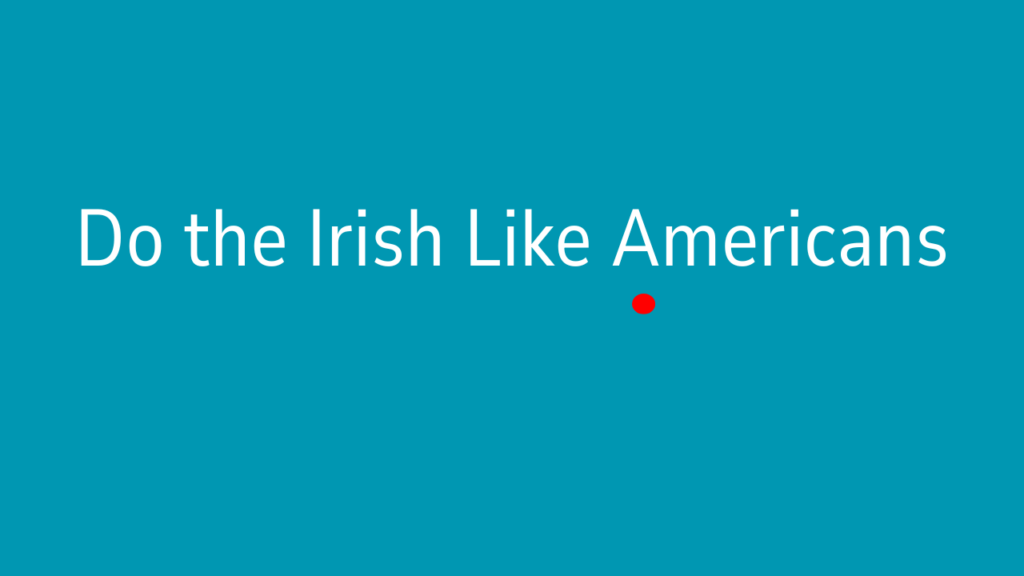Ireland is a great place to work, known for its friendly people, growing economy, and opportunities in various industries. Whether you’re a local or a newcomer, finding a job in Ireland can be made easier by following the right steps. This guide will help you navigate the process in simple terms.
Why Choose Ireland for Work?
- Growing economy: Ireland is a hub for tech, finance, and pharmaceuticals.
- Diverse opportunities: From farming to IT, there’s something for everyone.
- Quality of life: Beautiful landscapes and a strong work-life balance.
- International companies: Many global firms like Google, Facebook, and Apple have offices here.
Step 1: Understand the Irish Job Market

Popular Industries
Here’s a table showing industries in demand and the roles they often require:
| Industry | Popular Roles |
|---|---|
| Information Technology | Software developers, IT support |
| Healthcare | Nurses, doctors, caregivers |
| Education | Teachers, academic assistants |
| Hospitality | Chefs, hotel staff, bartenders |
| Construction | Engineers, laborers, project managers |
Skills in Demand
- Digital skills: Programming, cybersecurity.
- Language skills: English is essential, but additional languages are a bonus.
- Soft skills: Communication, teamwork, adaptability.
Step 2: Prepare Your Documents

Having your documents ready is essential before applying for jobs.
Checklist:
- CV (Curriculum Vitae):
- Keep it clear and professional.
- Highlight your achievements.
- Cover Letter:
- Tailor it to each job.
- Mention why you’re interested in the role.
- Educational Certificates:
- Ensure they are recognized in Ireland.
- Work Experience:
- Reference letters from previous employers.
- Work Visa or Residency Documents (if applicable):
- Non-EU citizens usually need a visa to work in Ireland.
Step 3: Research Job Opportunities
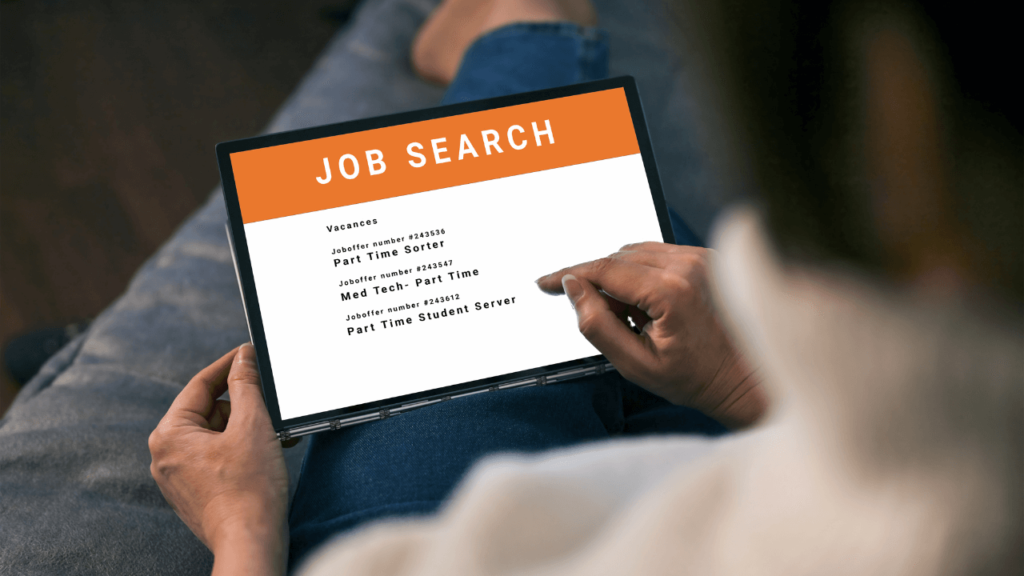
Where to Look for Jobs in Ireland
- Job Portals:
- Company Websites:
- Visit the careers section of companies you’re interested in.
- Recruitment Agencies:
- Adecco Ireland
- FRS Recruitment
- CPL Recruitment
- Networking:
- Attend local job fairs.
- Use LinkedIn to connect with employers.
- Local Newspapers:
- Check the job listings in newspapers like The Irish Times.
Step 4: Learn About Work Permits and Visas
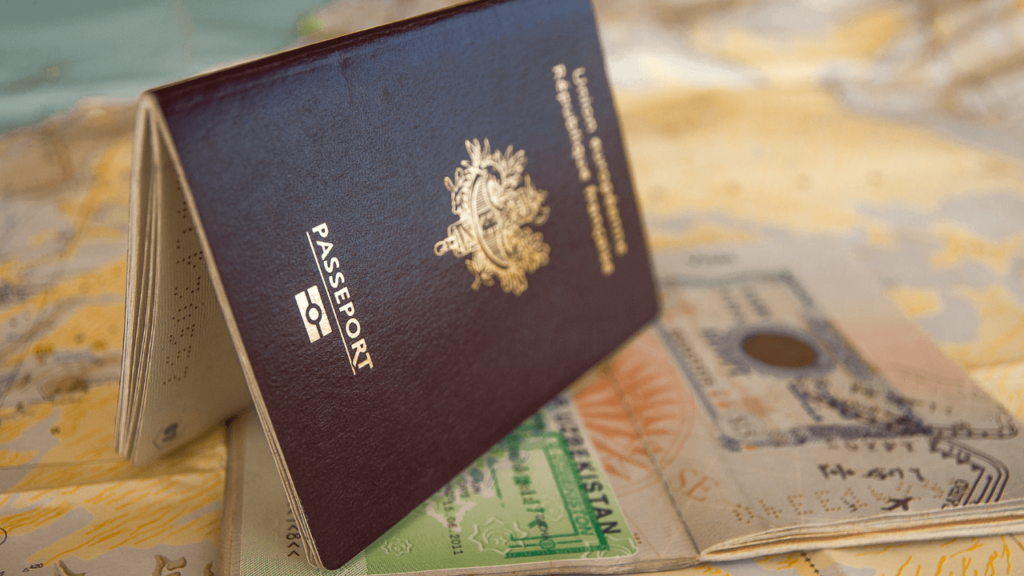
Who Needs a Work Permit?
- EU/EEA Citizens: No work permit needed.
- Non-EU Citizens: Require a valid work permit.
Types of Work Permits
- Critical Skills Employment Permit:
- For highly skilled workers (e.g., IT specialists, engineers).
- General Employment Permit:
- For roles not on the critical skills list.
- Spousal Work Permit:
- For spouses of valid permit holders.
How to Apply for a Work Permit
- Visit Ireland’s Immigration Website.
- Submit necessary documents like job offer letter, CV, and qualifications.
Step 5: Tailor Your Application

Tips for Success
- Customize your CV and cover letter for each job.
- Research the company and mention relevant points in your application.
- Include keywords from the job description.
Step 6: Ace the Interview

Types of Interviews in Ireland
- Phone or Video Interview: Common for the first round.
- In-person Interview: Often the final stage.
Interview Tips
- Dress professionally.
- Arrive on time.
- Prepare answers for common questions:
- “Tell us about yourself.”
- “Why do you want to work here?”
- “What are your strengths and weaknesses?”
- Ask questions about the role or company.
- Follow up with a thank-you email after the interview.
Comprehensive Guide for Everyone
Ireland is a land of opportunity for people from different backgrounds and experiences. Whether you’re a foreigner, a student, or someone without much experience, this guide will address your specific needs to help you secure a job in Ireland.
How to Get a Job in Ireland as a Foreigner?
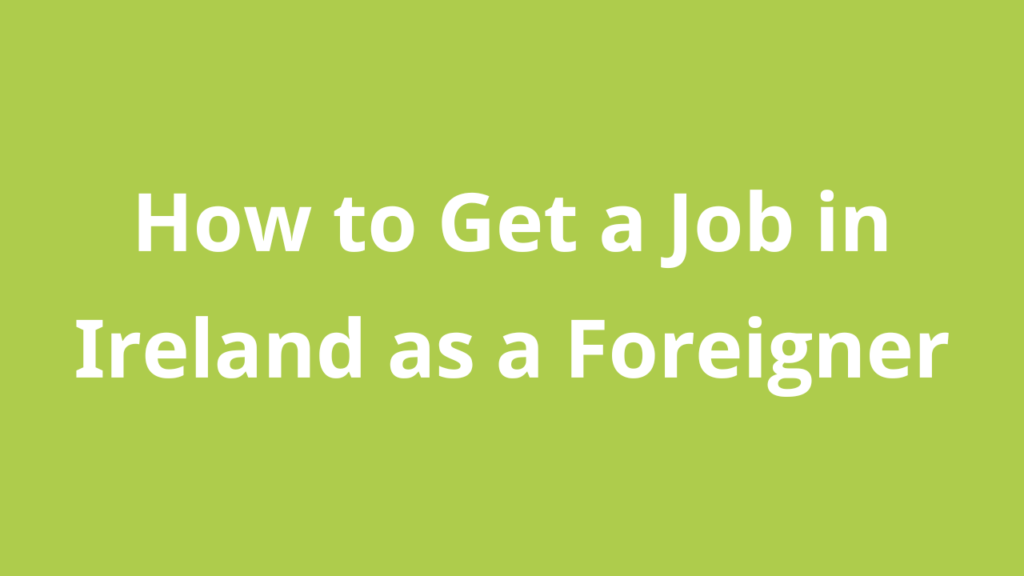
For foreigners, the key to landing a job in Ireland lies in understanding immigration rules, tailoring applications, and tapping into the right networks.
Steps to Follow:
- Understand Work Permits:
- Non-EU/EEA citizens need a work permit. The main permits include the Critical Skills Employment Permit and General Employment Permit.
- Apply via Irish Immigration.
- Target High-Demand Sectors:
- IT, healthcare, construction, and finance often seek foreign talent.
- Leverage International Job Portals:
- Websites like LinkedIn, Indeed, and IrishJobs.ie list jobs open to foreigners.
- Network:
- Attend job fairs and connect with Irish professionals through LinkedIn.
- Prepare Your Documents:
- A well-written CV, cover letter, and validated educational certificates are essential.
- Learn the Culture:
- Understanding Irish work etiquette, like punctuality and teamwork, will help you integrate smoothly.
How to Get a Job in Ireland from Nigeria?

If you’re in Nigeria and wish to work in Ireland, preparation is key.
Steps to Follow:
- Research Visa Requirements:
- Nigerians need a valid work permit to work in Ireland. Critical Skills and General Employment Permits are the most common.
- Search for Jobs Online:
- Use international job portals like Jobs.ie and Indeed.ie.
- Look for companies that are willing to sponsor work permits.
- Apply for In-Demand Roles:
- Nurses, IT professionals, and engineers are in high demand in Ireland.
- Tailor Your CV:
- Highlight relevant experience and skills.
- Avoid general applications; customize for each role.
- Work with Recruitment Agencies:
- Contact agencies like FRS Recruitment or CPL Recruitment that specialize in hiring for Ireland.
- Prepare for Interviews:
- Many interviews will be conducted online, so ensure you have a stable internet connection and practice answering common questions.
How to Get a Job in Ireland with No Experience?

If you have no experience, focus on entry-level roles and showcase transferable skills.
Steps to Follow:
- Focus on Entry-Level Jobs:
- Retail, hospitality, and customer service roles often don’t require experience.
- Volunteer or Intern:
- Gaining unpaid experience can help build your CV and network.
- Upskill Online:
- Take free or affordable courses on platforms like Coursera or Udemy.
- Focus on skills in demand, like digital marketing or IT basics.
- Highlight Soft Skills:
- Show communication, teamwork, and problem-solving abilities in your application.
- Ask for Recommendations:
- References from teachers or community leaders can strengthen your application.
How to Get a Job in Ireland from India?

Indians seeking jobs in Ireland can benefit from a growing demand for skilled professionals in IT, healthcare, and engineering.
Steps to Follow:
- Apply for Jobs Online:
- Use platforms like LinkedIn, Naukri.com, and IrishJobs.ie.
- Target Multinational Companies:
- Many Indian professionals find roles in tech giants like Google and Facebook in Ireland.
- Prepare for Visa Application:
- Most Indian professionals require a Critical Skills Employment Permit.
- Upskill in Demand Areas:
- Familiarize yourself with tools or technologies popular in Ireland, like programming languages or SAP.
- Build a Network:
- Connect with Indian communities in Ireland who can guide you through the process.
How to Get a Job in Ireland as an American?
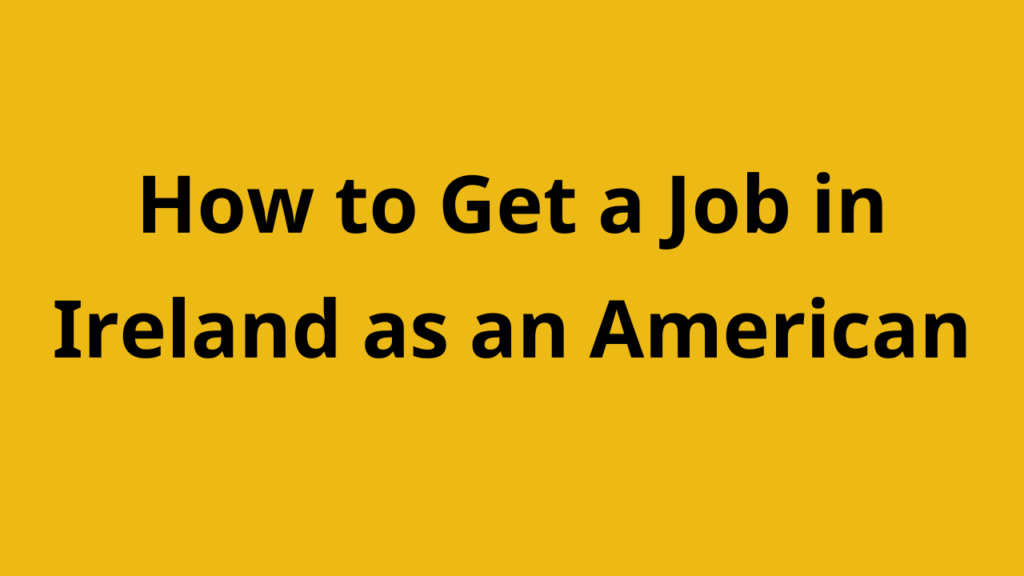
Americans have a slight edge due to the shared English language and cultural similarities.
Steps to Follow:
- Check Visa Requirements:
- While EU citizens don’t need a visa, Americans require a work permit to stay and work in Ireland.
- Leverage Multinational Firms:
- Many U.S.-based companies have offices in Ireland, such as Apple and Microsoft.
- Explore Remote Work Options:
- Some jobs allow Americans to start working remotely before relocating.
- Use Irish Job Boards:
- Websites like Jobs.ie and Indeed.ie are great resources.
- Learn Irish Work Culture:
- Focus on teamwork and relationship-building, as they are highly valued in Ireland.
How to Get a Job in Ireland at 16?
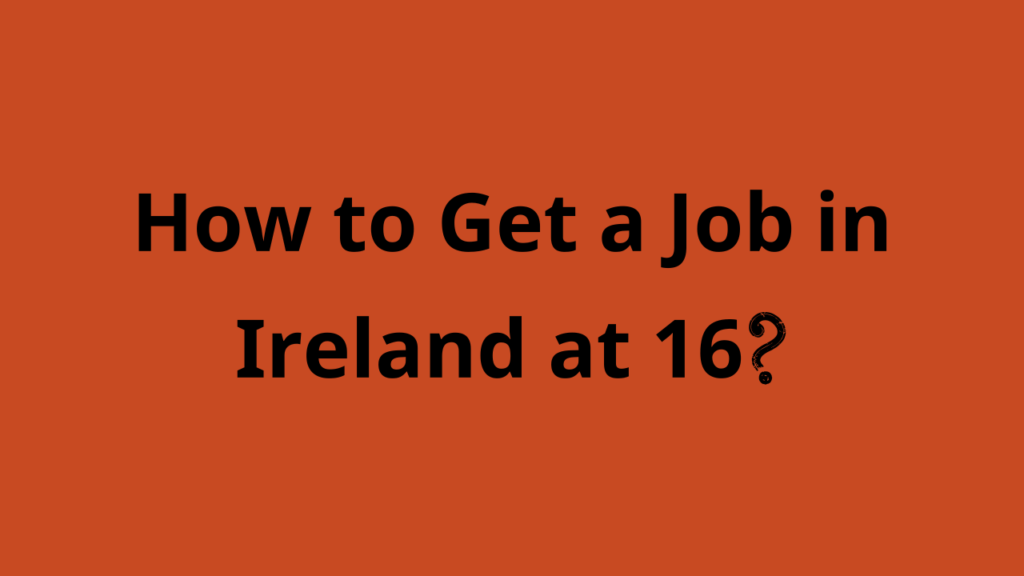
Teenagers in Ireland can find part-time or entry-level jobs to gain experience.
Steps to Follow:
- Check Legal Requirements:
- Irish law allows 16-year-olds to work up to 40 hours per week.
- Target Part-Time Jobs:
- Look for roles in retail, hospitality, and fast-food restaurants.
- Prepare a Simple CV:
- Mention school achievements, hobbies, and any volunteer work.
- Ask Locally:
- Visit local businesses and ask if they are hiring.
- Use Job Websites:
- Check sites like Jobs.ie and Indeed.ie for part-time listings.
Step 7: Adjust to Working Life in Ireland
Work Culture in Ireland
- Friendly environment: People value good relationships at work.
- Punctuality: Being on time is important.
- Teamwork: Collaboration is highly valued.
Employee Benefits
- Paid holidays (20 days minimum per year).
- Public holidays off.
- Maternity and paternity leave.
Step 8: Common Challenges and How to Overcome Them
Challenge: Competition for jobs.
Solution: Build skills and network actively.
Challenge: Adapting to new work culture.
Solution: Stay open-minded and ask questions when unsure.
Challenge: Language barriers.
Solution: Improve your English through courses or practice.
FAQs
1. Do I need to know Irish to work in Ireland?
No, English is the main language for business.
2. Can I work part-time as a student?
Yes, international students can work up to 20 hours per week during term time.
3. How long does it take to get a work permit?
Usually 4-8 weeks, depending on the permit type.
Do I need a work permit to work in Ireland?
- EU/EEA Citizens: No, you don’t need a work permit.
- Non-EU Citizens: Yes, a valid work permit is required. Common permits include the Critical Skills Employment Permit and General Employment Permit.
What are the high-demand industries in Ireland?
- IT and software development
- Healthcare and nursing
- Finance and accounting
- Hospitality and tourism
- Construction and engineering
How can I apply for a work permit in Ireland?
You can apply through the official Irish immigration website (Irish Immigration Service) by providing necessary documents such as a job offer letter, educational qualifications, and proof of skills.
What job portals are best for finding work in Ireland?
Can I work in Ireland while studying?
Yes, international students can work part-time (up to 20 hours per week during term time and 40 hours during holidays).
How do I prepare for interviews in Ireland?
- Research the company and the role.
- Practice common interview questions.
- Dress professionally and arrive on time.
- Follow up with a thank-you email after the interview.
Is it easy for Americans to get jobs in Ireland?
Americans may find opportunities through multinational companies with offices in Ireland. However, a work permit is required unless you have Irish citizenship or ancestry.
Can I move to Ireland first and look for a job?
EU/EEA citizens can move freely and look for work. Non-EU citizens typically need to secure a job and work permit before relocating.
What is the minimum wage in Ireland?
As of 2024, the minimum wage is €12.70 per hour, but it may vary depending on age and job type.
Can I get a job in Ireland from my home country (e.g., Nigeria or India)?
Yes, many employers in Ireland conduct online interviews for foreign applicants. Focus on roles that offer work permit sponsorship.
What documents are required to apply for jobs in Ireland?
- CV (Curriculum Vitae)
- Cover letter
- Educational certificates
- References from previous employers
- Proof of work permit or eligibility to work in Ireland
How long does it take to process a work permit?
The processing time for a work permit typically ranges from 4 to 8 weeks, depending on the type of permit.
What age can you start working in Ireland?
The legal working age in Ireland is 16. However, there are restrictions on working hours for minors.
What salary can I expect in Ireland?
Salaries depend on the industry and role. For example:
- IT professionals: €40,000–€70,000 per year.
- Nurses: €30,000–€50,000 per year.
- Entry-level retail roles: €22,000–€30,000 per year.
Final Thoughts
Getting a job in Ireland is an exciting opportunity, but it requires preparation and persistence. By understanding the job market, tailoring your applications, and preparing for interviews, you can significantly increase your chances of success.
Good luck with your job search in Ireland!

Hi, I’m Tanvir, the founder and author of Explore Ireland Now. With a deep love for Ireland and its rich culture, history, and landscapes, I created this site to share everything that makes this beautiful country worth exploring. Whether you’re a local looking for hidden gems or a traveler planning your next adventure, I provide insightful guides, tips, and recommendations to help you experience Ireland to the fullest.
From stunning landscapes to vibrant cities and quaint villages, Ireland is full of wonders waiting to be discovered. Through my personal experiences and research, I aim to bring you the most up-to-date information and inspiration for your journey.
Thank you for visiting Explore Ireland Now—I hope my content helps you uncover all that this incredible country has to offer! If you have any questions or need travel advice, feel free to reach out.
